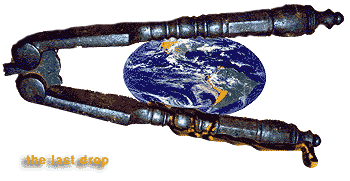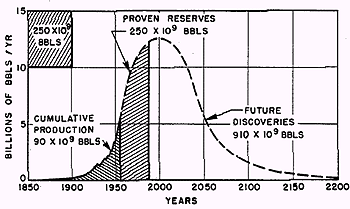|
from 07 may 2006 blue vol V, #4 |
|
|
of the Free Market Economy 
by John from NE Ohio
The term “peak oil” is absent from the lexicon of most policymakers. However, as oil prices continue to elevate and political turmoil ravages across the last remaining strongholds of cheap energy resources, peak oil may be upon us before most are even able to define it. M. King Hubbert, a geophysicist from Texas, was well known for his research on the capacities of oil fields. He became famous when his 1956 prediction of the peak of American oil production in the 1970s proved accurate. He also speculated worldwide oil production peaking around the year 2000. Many agree that had political events in the1970s not transpired in the Middle East spurring drastic conservation policies domestically, Hubbert’s estimated 2000 peak might well have proven correct.

Hubbert’s theory relies on the notion that oil, as a finite resource, limited in volume, will eventually pass a point where the cost of extraction will outcrop the profit derived from obtaining it in the first place. Energy return on energy invested (EROEI) with regards to oil production is crucial to understanding the peak oil theory. Hubbert’s model, therefore, does not require the world to “run out of” oil. We simply need to pass the point where EROEI falls below a ratio of one barrel of oil burned for everyone one extracted before we find ourselves on the down slope of the peak oil curve. The potential ramifications of such an even cannot be underestimated. The modern, global economy is unwaveringly dependent on cheap fossil fuels. As more and more emerging markets, particularly China and India, acquire an appetite for fossil fuels on par with that of the United States, this predicament appears all the more imminent. According to author Thomas Friedman, the city of Beijing alone adds 30,000 new cars to its roadways every month. With a country of 1.3 billion clamoring for position in the crowded fossil fuel lunch line, how can dwindling fossil fuel supply possibly keep up with global demand? Returning to the agriculture industry, let us speculate what the ramifications of increasingly scarce fossil fuels would have on global food production and distribution. Chemicals derived from natural gas and oil produce the fertilizers and pesticides driving our massive, worldwide agribusiness. According to Pfeiffer’s article, between 1950 and 1984, the Green Revolution increased food production by 250 percent. In total, 17 percent of the United States’ energy output is accounted for by agriculture. He goes on to explain that ten calories of fossil fuels are burned for every one calorie of food consumed. When considering that not only is the scale of modern food production wholly dependent on fossil fuels, but also its distribution, it is not hard to visualize the potential disaster global peak oil would present. Moreover, as Brazil gains increasing international attention for their claimed energy self sufficiency via ethanol derived from sugarcane, it must be remembered that these very fields are producing massive yields with the help of pesticides and fertilizers derived from fossil fuels. In closing, I would like to say that I believe it is necessary for us to reexamine the very lifestyle we enjoy as Americans that has such a bleak outlook for future sustainability. The question must be asked, how can a domestic and global economy, completely dependent on exponential growth, possibly sustain itself on finite resources? As I have demonstrated with the agriculture industry, it is simply not possible. While the seemingly abundant supply of cheap fossil fuels may appear as justification for some to produce more SUVs and enjoy a completely inefficient method of food production, I believe it is imperative that we begin mobilizing now to salvage what we can of a society whose future looks disturbingly grim.
|
| BLUE is looking for short fiction, extracts of novels, poetry, lyrics, polemics, opinions, eyewitness accounts, reportage, features, information and arts in any form relating to eco cultural- social- spiritual issues, events and activites (creative and political). Send to Newsdesk. |
